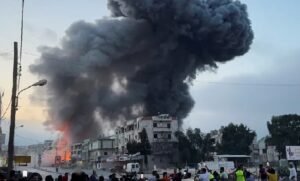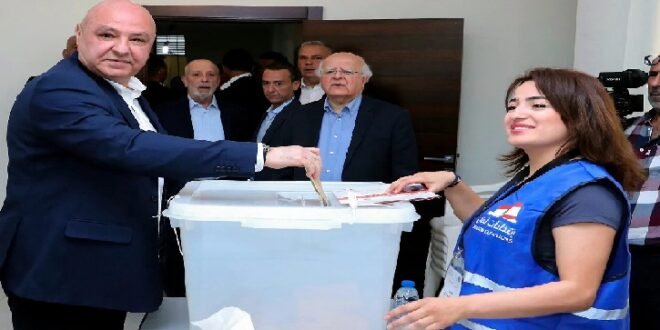28-05-2025
BEIRUT: As southern Lebanon continues to suffer from sporadic Israeli attacks despite a ceasefire signed in November between Israel and the Lebanese group Hezbollah, establishment parties have emerged as the biggest winners of municipal elections.
Voting took place over four weeks, starting in Mount Lebanon, north of the capital, Beirut followed by the country’s northern districts, Beirut and the eastern Bekaa Valley and concluding on Saturday in southern Lebanon.
 While Hezbollah, a Shia Muslim political and armed group, suffered setbacks to its political influence and military capabilities during 14 months of war with Israel, the group’s voter base was still intact and handed it and Amal, its closest political ally, victories across dozens of municipalities.
While Hezbollah, a Shia Muslim political and armed group, suffered setbacks to its political influence and military capabilities during 14 months of war with Israel, the group’s voter base was still intact and handed it and Amal, its closest political ally, victories across dozens of municipalities.
“The Hezbollah-Amal alliance has held firm and support among the Shia base has not experienced any dramatic erosion,” Imad Salamey, a professor of political science at the Lebanese American University, told media.
Despite establishment parties winning the majority of seats across the country, candidates running on campaigns of political reform and opposition to the political establishment also made inroads in some parts of the country, even winning seats in municipalities in southern Lebanon, where Hezbollah historically has enjoyed strong support.
In Lebanon, there is no unified bloc of reformists although political actors and groups that emerged during the 2019 antigovernment protests over the economic crisis are referred to locally as “el-tagheyereen”, or change makers.
“Alternative Shia candidates in some localities were able to run without facing significant intimidation, signaling a limited but growing space for dissent within the community,” Salamey said.
The fact the elections were held at all will be seen as a boon to the pro-reform government of Prime Minister Nawaf Salam, who came to power in January, say analysts. The polls, initially set for 2022, were delayed three times due to parliamentary elections, funding issues and the war with Israel, which started in October 2023.
 Critics, however, argued the elections favored established parties because the uncertainty over when they would be held meant candidates waited to build their campaigns. As recently as March, there were still proposals to delay the elections until September to give candidates a chance to prepare their platforms after Lebanon suffered through the war and a two-month intensification by Israel from September to November, which left the country needing $11bn for recovery and reconstruction, according to the World Bank.
Critics, however, argued the elections favored established parties because the uncertainty over when they would be held meant candidates waited to build their campaigns. As recently as March, there were still proposals to delay the elections until September to give candidates a chance to prepare their platforms after Lebanon suffered through the war and a two-month intensification by Israel from September to November, which left the country needing $11bn for recovery and reconstruction, according to the World Bank.
The war left Hezbollah politically and militarily battered after Israel killed much of its leadership including longtime Secretary-General Hassan Nasrallah and his successor Hachem Safieddine.
The war reordered the power balance in Lebanon, diminishing Hezbollah’s influence. Many villages in southern Lebanon are still inaccessible, and Israel continues to occupy five points of Lebanese territory that it has refused to withdraw from after the ceasefire. It also continues to attack other parts of the south, where it claims Hezbollah still has weapons.
With their village’s still destroyed or too dangerous to access, many southerners cast ballots in Nabatieh or Tyre, an act that recalls the 18-year Israeli occupation of southern Lebanon that ended in 2000. During the occupation, elections for southern regions under Israeli control were also held in other cities still under Lebanese sovereignty. (Int’l Monitoring Desk)
 Pressmediaofindia
Pressmediaofindia




